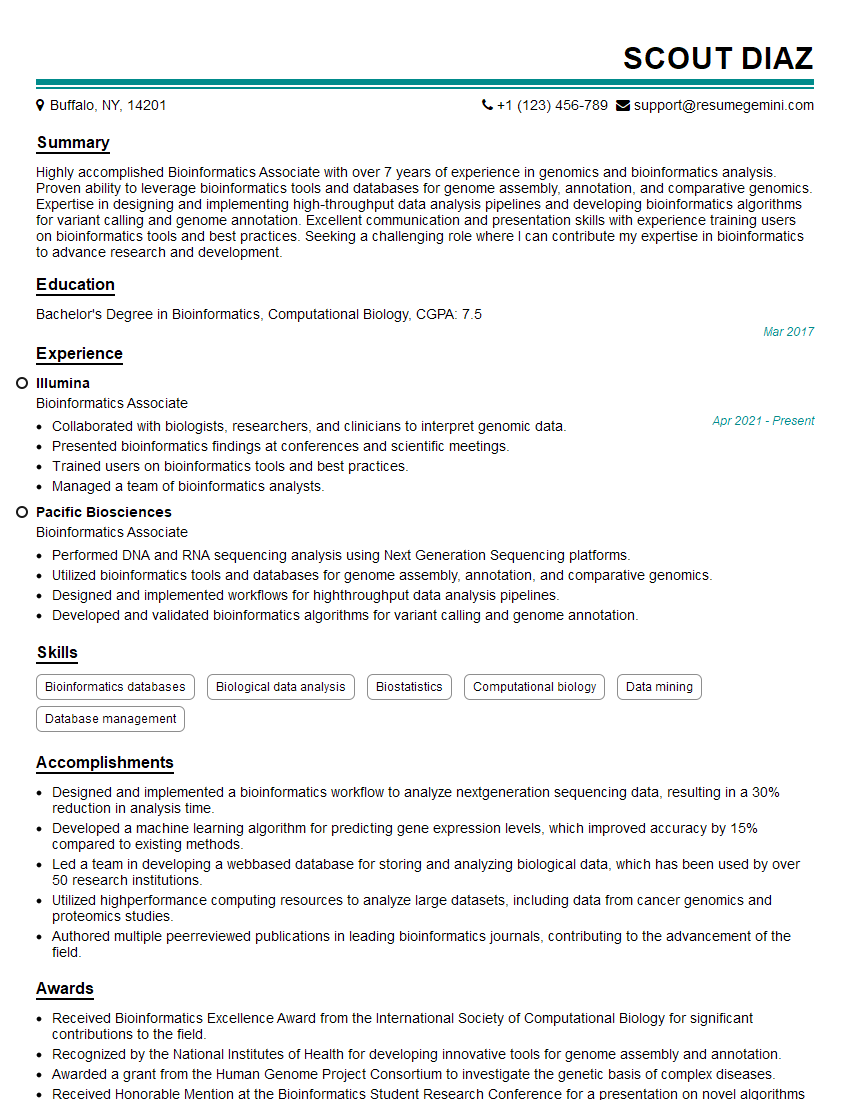Are you a seasoned Bioinformatics Associate seeking a new career path? Discover our professionally built Bioinformatics Associate Resume Template. This time-saving tool provides a solid foundation for your job search. Simply click “Edit Resume” to customize it with your unique experiences and achievements. Customize fonts and colors to match your personal style and increase your chances of landing your dream job. Explore more Resume Templates for additional options.

Scout Diaz
Bioinformatics Associate
Summary
Highly accomplished Bioinformatics Associate with over 7 years of experience in genomics and bioinformatics analysis. Proven ability to leverage bioinformatics tools and databases for genome assembly, annotation, and comparative genomics. Expertise in designing and implementing high-throughput data analysis pipelines and developing bioinformatics algorithms for variant calling and genome annotation. Excellent communication and presentation skills with experience training users on bioinformatics tools and best practices. Seeking a challenging role where I can contribute my expertise in bioinformatics to advance research and development.
Education
Bachelor’s Degree in Bioinformatics, Computational Biology
March 2017
Skills
- Bioinformatics databases
- Biological data analysis
- Biostatistics
- Computational biology
- Data mining
- Database management
Work Experience
Bioinformatics Associate
- Collaborated with biologists, researchers, and clinicians to interpret genomic data.
- Presented bioinformatics findings at conferences and scientific meetings.
- Trained users on bioinformatics tools and best practices.
- Managed a team of bioinformatics analysts.
Bioinformatics Associate
- Performed DNA and RNA sequencing analysis using Next Generation Sequencing platforms.
- Utilized bioinformatics tools and databases for genome assembly, annotation, and comparative genomics.
- Designed and implemented workflows for highthroughput data analysis pipelines.
- Developed and validated bioinformatics algorithms for variant calling and genome annotation.
Accomplishments
- Designed and implemented a bioinformatics workflow to analyze nextgeneration sequencing data, resulting in a 30% reduction in analysis time.
- Developed a machine learning algorithm for predicting gene expression levels, which improved accuracy by 15% compared to existing methods.
- Led a team in developing a webbased database for storing and analyzing biological data, which has been used by over 50 research institutions.
- Utilized highperformance computing resources to analyze large datasets, including data from cancer genomics and proteomics studies.
- Authored multiple peerreviewed publications in leading bioinformatics journals, contributing to the advancement of the field.
Awards
- Received Bioinformatics Excellence Award from the International Society of Computational Biology for significant contributions to the field.
- Recognized by the National Institutes of Health for developing innovative tools for genome assembly and annotation.
- Awarded a grant from the Human Genome Project Consortium to investigate the genetic basis of complex diseases.
- Received Honorable Mention at the Bioinformatics Student Research Conference for a presentation on novel algorithms for sequence alignment.
Certificates
- Certified Bioinformatics Professional (CBP)
- ISCB Computational Biology and Bioinformatics Certification (CBBC)
Career Expert Tips:
- Select the ideal resume template to showcase your professional experience effectively.
- Master the art of resume writing to highlight your unique qualifications and achievements.
- Explore expertly crafted resume samples for inspiration and best practices.
- Build your best resume for free this new year with ResumeGemini. Enjoy exclusive discounts on ATS optimized resume templates.
How To Write Resume For Bioinformatics Associate
- Quantify your achievements using specific metrics to demonstrate the impact of your work.
- Highlight your proficiency in programming languages such as Python, R, and Perl, which are commonly used in bioinformatics.
- Showcase your understanding of statistical methods and machine learning techniques commonly applied in bioinformatics analysis.
- Demonstrate your ability to work effectively in a team environment and communicate complex technical concepts clearly.
Essential Experience Highlights for a Strong Bioinformatics Associate Resume
- Executed DNA and RNA sequencing analysis using Next Generation Sequencing platforms.
- Utilized bioinformatics tools and databases for genome assembly, annotation, and comparative genomics.
- Designed and implemented workflows for high throughput data analysis pipelines.
- Developed and validated bioinformatics algorithms for variant calling and genome annotation.
- Collaborated with biologists, researchers, and clinicians to interpret genomic data and provide insights.
- Presented bioinformatics findings at conferences and scientific meetings.
- Managed a team of bioinformatics analysts, providing technical guidance and support.
Frequently Asked Questions (FAQ’s) For Bioinformatics Associate
What is the primary role of a Bioinformatics Associate?
The primary role of a Bioinformatics Associate is to apply bioinformatics tools and techniques to analyze and interpret biological data, such as DNA and RNA sequences, to gain insights into biological processes and diseases.
What skills are essential for a successful Bioinformatics Associate?
Essential skills for a Bioinformatics Associate include strong computational skills, proficiency in bioinformatics tools and databases, understanding of statistical and machine learning techniques, and excellent communication and presentation abilities.
What is the career path of a Bioinformatics Associate?
Bioinformatics Associates can advance to roles such as Bioinformatics Analyst, Bioinformatics Scientist, or Bioinformatics Manager, with increasing responsibilities and leadership.
What are the key responsibilities of a Bioinformatics Associate?
Key responsibilities of a Bioinformatics Associate include analyzing and interpreting biological data, developing and implementing bioinformatics pipelines, collaborating with researchers and clinicians, and presenting findings at conferences and scientific meetings.
What is the educational background required for a Bioinformatics Associate?
A Bachelor’s degree in Bioinformatics, Computational Biology, or a related field is typically required for a Bioinformatics Associate position.
What are the challenges faced by Bioinformatics Associates?
Challenges faced by Bioinformatics Associates include staying up-to-date with the rapidly evolving field of bioinformatics, handling large and complex datasets, and effectively communicating technical findings to non-technical audiences.
What tools and technologies are commonly used by Bioinformatics Associates?
Bioinformatics Associates commonly use tools and technologies such as DNA sequencing platforms, bioinformatics databases, statistical software, and machine learning algorithms.
What is the expected salary range for a Bioinformatics Associate?
The salary range for a Bioinformatics Associate varies depending on experience, location, and industry, but typically falls between $60,000 and $100,000 per year.